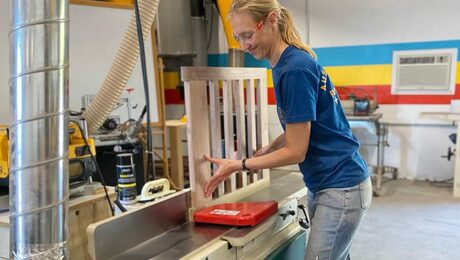
I love a niche event, especially when there’s a bit of competition involved. So when my partner and I found ourselves living for a season in Camden, Maine–home of the International Toboggan Championships–we went all in.

The National Toboggan Championships have been running for decades at the Camden Snow Bowl. At the heart of the event is the historic, wooden toboggan chute, which has been laced with ice. At the top of a hill, riders load 2-4 people onto a toboggan, arms folded like a mummy, legs wrapped around the rider in front. Then a lever is pulled, and your toboggan drops onto a wooden track for a ten second joy ride that spits you onto a frozen pond. Toboggans gain speeds upward of 40 mph! The pro’s manage the ride without screaming, but I let out some noise: part joy, part terror.
 |
 |
Our first order of business was to build a toboggan. Sure, you can buy or borrow a toboggan, but as a wood school student at the time, I wanted the full experience. We studied the rules and guidelines, which specify the acceptable height of the curl, allowable distance between slats, and overall weight restrictions. On New Year’s Day I milled a ten foot, 8/4 board of air dried ash into slat material ready for steam bending.
We bent two thicknesses of slats: ⅜ for regular slats and ½ thick for the runners. Steam-bending the curls was a matter of trial and error. We learned about compression-failure the hard way, and eventually crowdsourced enough wisdom to find a few tricks. We pre-soaked the wood before steaming, bent them in plastic, and fashioned a long bending strap made from tin flashing which helped compress the outside fiber of the wood. After the curls were bent, we set each one in a drying form which held the curl. Our bending form had a 10 inch radius, and the slats “sprung back” to form a 12 inch overall curl. While official rules allow bent laminated and kerf-cut curls as well, steam-bending seemed to be the more traditional choice. I milled mahogany stretchers and hand shaped the arm rests with hand tools.

Mid-toboggan project, I happened to take a class in double bevel marquetry, so I hand cut a marquetry panel of a snowy moonscape to accompany our team name “Moonwalkers.” Maybe the hardest part of the build was creating the stretcher to hold the ends of all the curled slats. I treated the slat ends as tenon, and made a long groove cut with a dado stack on the table saw to become the mortise. We wrestled those wiley tenons into the mortise with the help of some epoxy.

For a final touch, I inlaid bowling-alley-like racing stripes using a small trim router, a chisel, and ⅛ inch thick bits of mahogany. We assembled the toboggan with brass screws. My partner spliced nylon ropes to hold the curl in place and give us a handle, while I sewed a colorful cushion (required per regulations). Seven or eight coats of marine varnish brought this 30 pound beauty of a sled to life. My partner applied several coats of cross-country ski wax to the runners before each race.

Race weekend felt like stepping into a wintry tailgate party! After our toboggan passed official inspection, we could relax and enjoy it. A sports announcer kept his eye on the track, announcing hundreds and hundreds of teams as their toboggans raced down the track. There was a costume parade, food and beverage vendors, folks huddled over campfires to keep warm. We met folks from all over the country, and a lot of locals who return every year to test the limits of their sled. Our Wood School friends shivered in the cold just to cheer on our 10 second descent. No feeling can compare to riding a toboggan clear across a frozen pond, wondering if it will stop before you hit the other side.
 |
 |
On race day, we learned from some of the pros–if you want to actually win the race, you need a sled with more weight. Build your toboggan just shy of the 50lb mark, and consider using plywood in your sled. While we may not have had the fastest toboggan (finishing 42 out of 100 in our category), it turned out we had the prettiest toboggan. Late on Sunday evening, we gathered for a small awards ceremony. To our delight, we won the Best Crafted Toboggan award, bestowed upon us by a mysterious judging process. It was a cold and windy weekend, but one that I will remember fondly for a long time.


STL318: Back to School

A beginner walks into a lumberyard

Dos and dont’s of asking questions in a woodworking class
Sign up for eletters today and get the latest techniques and how-to from Fine Woodworking, plus special offers.



